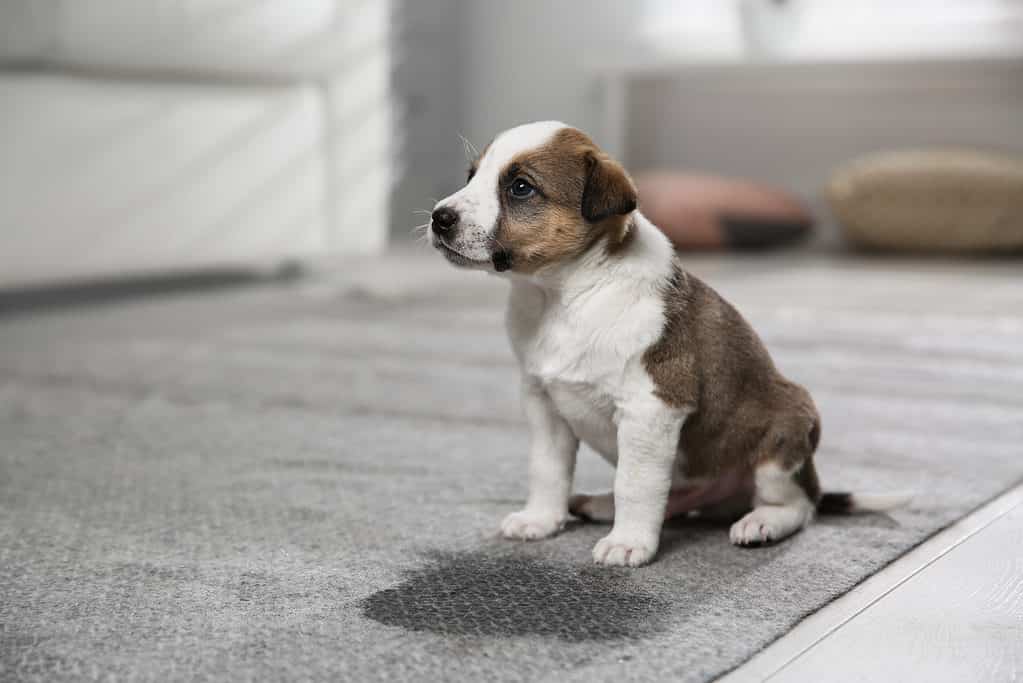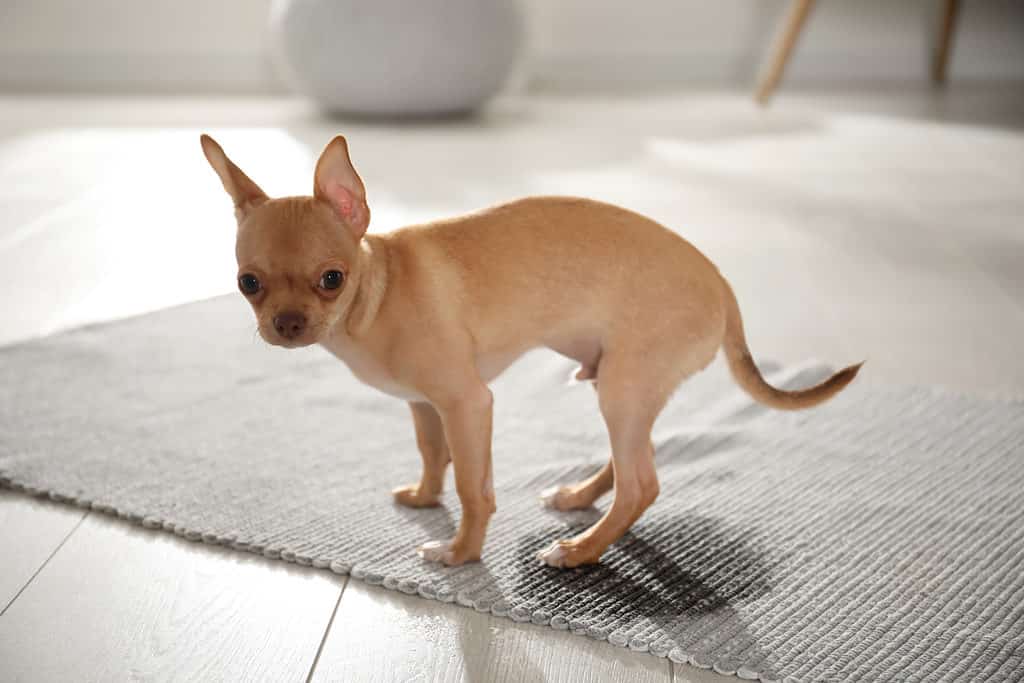No matter how much you love your canine family member, it is easy to become frustrated when they start having accidents in the house. A lot of time and effort goes into housetraining your beloved pup. With that, a regression in their potty training can leave you feeling extremely defeated.
A dog peeing inside can not only cause a lot of home damage, it can also put a wrench in the beautiful bond that you share. We want to help you get to the bottom of your dog’s sudden need to pee inside of your house. Let’s break down some of the most common causes of this behavior. Ranging from stress within your home to underlying medical conditions, let’s break down everything you need to know below.
Let’s get started!
Why Is My Dog Peeing In The House?

If your dog has made a regular habit of peeing in the house, there are a number of potential reasons for that.
©New Africa/Shutterstock.com
If your dog keeps peeing in the house, you are likely searching for any explanation behind this behavior. We want to help you get to the bottom of your dog’s accidents. Let’s break down the most common reasons behind a dog peeing inside below!
They Are Not Fully Potty Trained
If your dog is not completely potty trained, then they will be more likely to have accidents around your house. This can happen if the pup has not fully grasped the understanding of only peeing outside. This is the most common in young dogs or those that were just adopted.
If your dog has only been in your home for a short period and you believe they are still struggling with the idea of peeing outdoors, then this is likely the case of their frequent accidents. It might be time to increase your trips outside throughout the day. Make sure you take them outside each time they wake up from resting, and have a set feeding schedule.
They Are Not Going Outside Enough
If your canine friend is peeing inside all the time, then it might be time to reassess how often you take them outside. For example, if your dog is only let outside once in the morning and once at night, then there is a large gap in between in which they may struggle to hold their full bladder. Most dogs need to go outside a minimum of four times each day.
They Pee When They Get Excited
Does it seem like your dog only pees inside when they are overwhelmed with excitement? If this is the case for your pup, then they might be experiencing a behavior known as submissive urination. Submissive urination in dogs can occur when a dog is excited, nervous, shy, or even scared. It is most common in younger dogs, but it can occur in dogs of any age. Due to the fact that this behavior is typically a result of a dog not feeling entirely secure, the best way to limit it is by boosting their confidence through training and socialization.
They Are Territorial
If you have a dog that is not yet spayed or neutered, then it’s possible that they are peeing indoors to mark their territory. Reproductive hormones in dogs can make them more inclined to guard every aspect of their home. This often includes marking items around the house with their scent. Dogs that are peeing inside for territorial reasons will often pee small amounts in multiple areas of a room. They may also pee on objects or in spaces that other dogs frequent. New scents in the home can also contribute to the behavior. Many of these dogs will also mark more when they are stressed or anxious. It may look like your dog is frantically marking if they are ever overwhelmed.
One of the most effective ways to limit this behavior is by having your dog spayed or neutered. By reducing the reproductive hormones circulating in their system, your dog will feel less inclined to guard their home and mark their territory. It’s important to keep in mind, though, that if you sterilize your dog later in their life, they may already be accustomed to peeing inside of your home. Waiting until they are older to sterilize them can make it more challenging to put an end to the marking behavior.
They Are Experiencing Stress Or Anxiety
Underlying stress or anxiety in dogs can lead to inappropriate urination in many cases. Dogs can experience stress for many reasons. Some include being alone for long periods, frightening noises, the absence of a loved owner, and new pets at home. Stress can cause a dog to behave in many strange ways, and this includes suddenly peeing indoors.
If your potty-trained dog has suddenly begun to have accidents in your home, then look for any potential stressors. If there is a potential stressor causing them anxiety, you should address that issue as soon as possible.
They Are Submissive To Your Other Pets
Does your dog only pee inside when they are interacting with your other pets? If this is the case, then it’s possible that they are being submissive to the other animals in your home. If this is the reason behind your dog’s inappropriate urination, then you may notice your dog displaying submissive behaviors around the other animals in your home. This may include rolling over on their belly when they interact with your other pet, bowing their head or cowering to your other dog when they interact, nervous smiling around your other pet, or even avoiding your other pet altogether.
Some dogs are naturally submissive to other canine friends, but we suggest working with your pups to establish a better relationship. This can take time, but the submissive urination will typically resolve once your dog feels more secure around other pets.
They Have Underlying Urinary Complications
If any of the above factors are not the cause of your dog’s accidents around your home, then it is very possible that they are experiencing a urinary complication. One of the most common signs of a urinary condition in dogs is sudden accidents around the home. This is because these complications make it much harder to hold their bladder. You may also notice your dog squatting multiple times outside, peeing small amounts in multiple locations, a strong odor of their urine, blood in the urine, licking their genitals, and even crying out when they are peeing. If you notice any of the symptoms or do not think behavioral struggles are to blame, then we suggest having them seen by your vet as soon as possible.
Other Underlying Health Complications
In addition to urinary complications in some cases of inappropriate urination, so are many other underlying health conditions in dogs. There are many medical conditions in dogs that increase their thirst levels. This causes them to drink more water and urinate more throughout the day. Because they’re drinking so much water, it is also much harder for them to hold their bladder for extended periods.
Some of the medical conditions in dogs that can cause them to pee inside include diabetes, kidney disease, bladder stones, Cushing’s disease, and even the use of some medications. If you are concerned about any of these medical conditions in your canine friend, then we always suggest having them seen by a veterinarian as soon as possible.
Why Is My Potty Trained Dog Suddenly Peeing In The House?

If a fully potty-trained dog has a sudden onset of accidents in the house, there is usually an underlying condition that should be addressed with a veterinarian as soon as possible.
©New Africa/Shutterstock.com
If your adult dog is fully potty trained, then you should always take the sudden onset of accidents around you seriously. A potty-trained adult dog that is suddenly peeing indoors is likely experiencing some type of underlying condition. This is possible whether it is behavioral or medical in nature. Take a close look at your dog and their daily habits in this situation. Also, try to see if you can determine any potential stressors in their life. If there are no changes in their life or environment that could be causing them anxiety, then we suggest having them assessed by your vet for any underlying health conditions.
Why Is My Old Dog Suddenly Peeing In The House?
If your older dog is suddenly peeing inside of your home, have a veterinarian take a look at them. Senior dogs are much more prone to developing underlying health threats that can impact their urinary habits. Accidents around the home are often the first symptoms of these conditions owners notice. Many of the medical conditions that can cause urinary changes in old dogs will require ongoing care. With that, have a veterinarian see them the moment you notice this behavioral change. Not only can having them assessed and treated limit the amount of accidents they will have around the house, but it will also address any discomfort they might be experiencing.
What Scents Deter Dogs From Peeing?

Vinegar is one of the scents known to repel dogs and may prevent them from peeing inside your home.
©focal point/Shutterstock.com
If your dog continually pees in your home, and you know it is not from any health issues, there are some things you can try in order to make him refrain but this behavior. There are certain scents that dogs are not fond of and will often avoid peeing on. While it may not work in every case, there are some scents that will repel dogs to an area. Some of these are:
- Coffee Grounds
- Citrus
- Vinegar
- Chili
Each pet is different and they may not all be repelled by the same aromas. Some might have other scents that may work on them and you will have to figure out which one is best as a pee repellent. Once you find which one works for you, you can use a natural scented spray, which works best with the coffee and chili scents, or sprinkle the affected area with citrus rinds or vinegar.
Never use any item directly on a dog – it should only ever be sprayed on floors, carpets, couches, or whatever area you are targeting.
Final Thoughts
There are many factors that could be causing your dog to pee inside your home. These can range from underlying stress to developing urinary conditions. We suggest going over the potential causes of this behavior that we discussed above. Try to get to the bottom of your dog’s sudden accidents to make yourself and them more comfortable!
The photo featured at the top of this post is © New Africa/Shutterstock.com
Ready to discover the top 10 cutest dog breeds in the entire world?
How about the fastest dogs, the largest dogs and those that are -- quite frankly -- just the kindest dogs on the planet? Each day, AZ Animals sends out lists just like this to our thousands of email subscribers. And the best part? It's FREE. Join today by entering your email below.
Thank you for reading! Have some feedback for us? Contact the AZ Animals editorial team.






